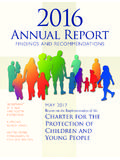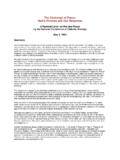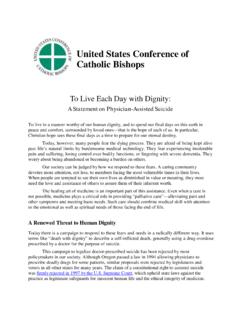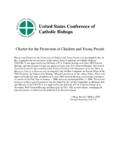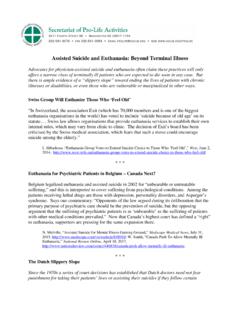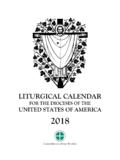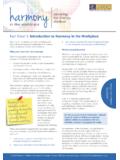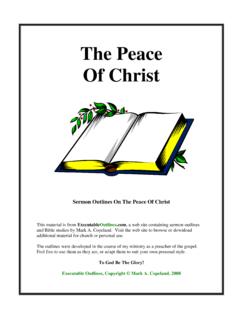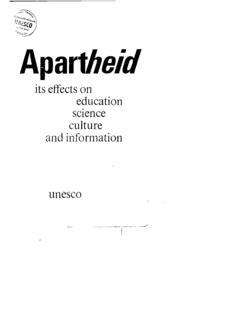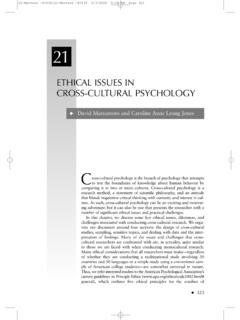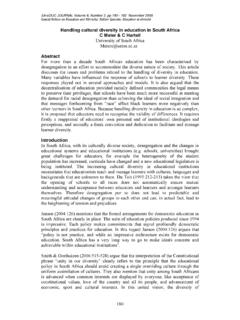Transcription of Civil Law as an Indispensable Tool Against Racism
1 Civil Law as an Indispensable Tool Against Racism Laws Against racial discrimination whether in employment, housing, education, voting or elsewhere put into action our Nation s guarantee of Equal Justice Under the Law, which is inscribed over the portico of the United States Supreme Court. The Civil Rights Act of 1964 and the Voting Rights Act of 1965 are two great federal monuments of a different kind ones written on paper, not made of stone. The Catholic bishops of the United States have supported these laws since their inception originally through the National Catholic Welfare Conference, and now through the United States Conference of Catholic Bishops out of their commitment to the inherent dignity of every human person, regardless of race.
2 Did You that the United States is not alone in dealing with Racism and discrimination. For example, the world s most populous democracy, India, still struggles to overcome a cultural system that discriminates Against certain people by dividing them into classes called castes. Dalits, the lowest caste, make up 17% of India s population. They suffer discrimination in employment, housing and education, despite laws that outlaw it. In addition, many Indian Christians are Dalits and actually suffer double discrimination. As Christians, they are not eligible for the reservation system that helps Hindu Dalits get jobs.
3 Christians are said to be without a caste, but everyone knows your caste. The local Church works hard to promote Dalit rights as well as their welfare. With the help of Catholic Relief Services, simple sturdy homes have been built to replace those swept away by floods in a poor Dalit village. Ecumenical and Interreligious Reflections Image of God Racism is an attack on the image of God that has been given to every one of us by the Creator (Gen. 5:1-3). Because each person has been created by God, we are all united together with the Lord and with each other.
4 Racism rejects what God has done by refusing to acknowledge the image of God in the other, the stranger and the one who is different. The fact that we were created in the image of God should remind us that each person is a living expression of God that must be respected and preserved and never dishonored. May They All Be One Racism is divisive and damages the harmony and oneness that should characterize all our relationships. What divides us does not have to destroy us. Differences do not have to frighten us. Following the advice of St. Paul, we can pray for the grace to look beyond our own prejudices: Be kind to one another, tenderhearted, forgiving one another, as God in Christ forgave you (Eph: 4:32).
5 Recall that before his death, Christ prayed, May they all be one (Jn 17:21). Lessons from the Holocaust The Holocaust is a reminder of what can go horribly wrong when we no longer recognize God in our neighbor. In 1965, the Second Vatican Council, in its landmark document Nostra Aetate, renounced anti-Semitism and the charge that Jews were collectively guilty for the death of Jesus Christ. This allowed for a new relationship between the Jews and the Church to be created, one that continues to heal centuries of misunderstanding and pain. Nostra Aetate sets out a clear mandate for all of us by claiming as foreign to the mind of Christ, any discrimination Against men or harassment of them because of their race, color, condition of life, or religion.
6 Christians Bear Responsibility The fight Against Racism concerns everyone. In 2011 Racism was the main theme at a meeting of Christian Churches Together in the USA, a new ecumenical forum that brings together representatives from almost all the various Christian traditions in our country. Together they reflected on the persistence of Racism in our country, and the role it has played in keeping many people in poverty. In a joint statement, these Christian leaders said, We call ourselves, our institutions, and our members to repentance. We make this confession before God and offer it to all who have endured Racism and injustice both within the church and in society.
7 To our shame, Christians have been part of the problem. So, as Christians, we need to be part of the solution. Loving the Neighbor When asked which was the first of all the commandments, Jesus replied the first is this: You shall love the Lord your God with all your heart, with all your soul, with all your mind, and with all your strength. And the second is this: You shall love your neighbor as yourself (Mk 12: 28-31). Obviously, Racism goes Against the commandment of love. We are all called, therefore, to oppose Racism in our communities. Loving neighbors who are different from us through kind and generous actions can be as simple as forming friendships, supporting minority-owned businesses, or participating in community activities with those of other faiths or other races.
8 Loving our God obligates us to love our neighbors as well. You Cannot Love God and Hate Your Neighbor Scripture teaches: If anyone says, I love God, and hates his brother, he is a liar; for whoever does not love a brother whom he has seen cannot love God whom he has not seen (1 Jn 4:20). This simple, straightforward teaching constitutes the heart of Christian ethics and is the reason Pope Benedict XVI can say, One is so closely connected to the other that to say that we love God becomes a lie if we are closed to our neighbor or hate him altogether (Deus Caritas Est 16).
9 To love our neighbor, fundamentally, is to respect him or her as a unique person made in the image and likeness of God. If we do not offer this respect to the creature, then we dishonor the Creator. Such a basic truth of the Christian faith must therefore be our guide when we consider the many kinds of people we encounter, people of different races, creeds, and traditions. Stories of Parishes Confronting Racism and Promoting Peace In West Baltimore, St. Peter Claver Catholic Church was on the front lines in responding to unrest that followed the death of Freddie Gray.
10 Parishioners continue to build on efforts begun four years ago to address neighborhood safety and improve community-police relations. They also participate in Bishop Madden s prayer walks in neighborhoods plagued by violence. In Ferguson, MO, parishioners at Blessed Teresa of Calcutta are engaging a Lean In listening process across cultures and raising awareness about racial issues. Children at the parish school study saints of various cultures to reflect on how they can imitate these heroes by engaging in efforts for dialogue and peace. All around St.
